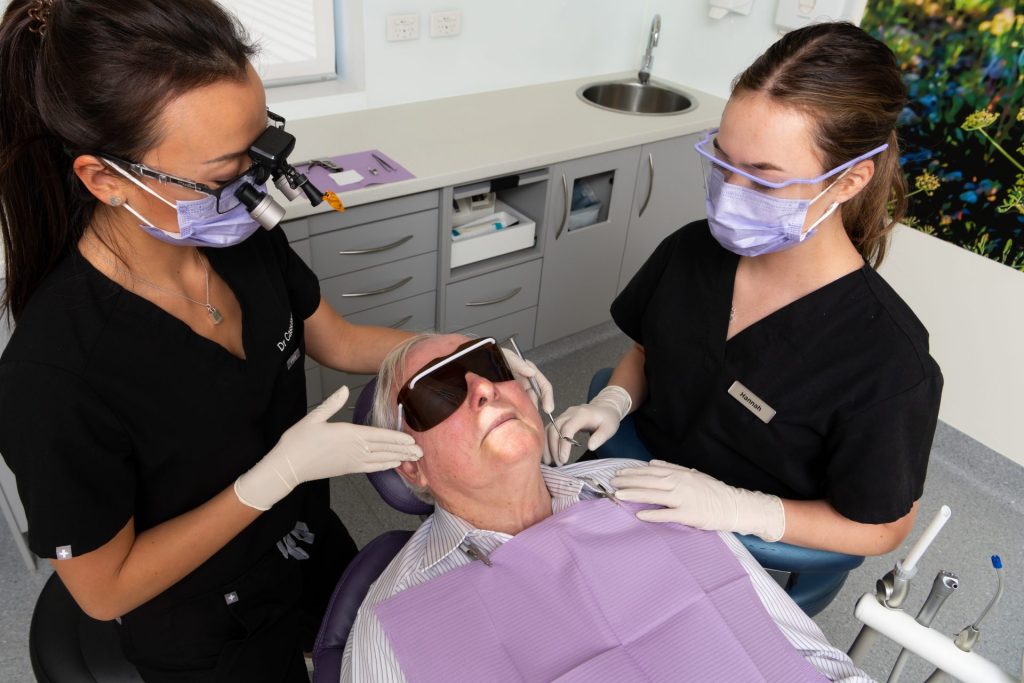
Get a good night's sleep
Sleep apnoea is one of the sleep disorders affecting many Australians. If left untreated, it can cause some issues ranging between minimal and severe conditions. Research has shown that untreated sleep apnoea can shorten your life by 10 years and increase your risk of stroke and cardiovascular issues!
You might wonder how this relates to dental services. Here at The Village Dentist, we can point you toward a reputable sleep physician who can set you up to conduct a sleep study to help identify the extent of your sleep apnoea. Once completed, we can determine a suitable dental device to help ease your symptoms.
Our expert dental team at our Castle Hill dental practice understands the importance of a good night’s sleep and is here to help you diagnose your sleep problems. We care as much about your general well-being as we do about your dental health!
What is obstructive sleep apnoea?
Obstructive sleep apnoea (OSA) causes sleep-disordered breathing. It’s essentially a more serious case of snoring in which you stop breathing for extended periods of time, which leads to many health implications if left untreated. When snoring regularly, it’s often because of nose and throat conditions, such as nasal blockages. How you sleep can also escalate your snoring. For example, if you sleep on your back, gravity pulls the soft tissues in your throat downwards, creating a tighter airway passage. Sleep-disordered breathing caused by OSA is different, though. There are two types of sleep apnoea disorders which you can review below:
Obstructive sleep apnoea
OSA is the most common sleep apnoea affecting many Australians and individuals around the world. OSA is when your airways become completely or partially blocked, usually by the soft tissue at the back of your throat collapsing. This causes your airway passage to become extremely tight or entirely blocked. Your chest diaphragm then struggles to open your airways, causing excessive excursion of your chest muscles and diaphragm. Your diaphragm is a thin muscle below your lungs that essentially allows you to inhale and exhale. If your diaphragm struggles to open your airways, it can drastically affect your sleep and lower the oxygen reaching your internal organs.
Central sleep apnoea
Central sleep apnoea is a bit more complex than OSA and involves issues with your central nervous system. If you have central sleep apnoea, your brain struggles to send messages to your diaphragm and chest muscles. These messages tell your body to breathe. If you have central sleep apnoea, you may likely require a continuous positive airway pressure (CPAP) mask. CPAP masks send pressurised air into your mouth as you sleep, holding open your airway.
How do I know if I have sleep apnoea?
It’s often difficult to know if you’re experiencing sleep disorders because you’re not exactly aware of your breathing and snoring while sleeping. However, there are some symptoms you might notice throughout the day that suggest you have OSA. A family member or partner might also notice your sleeping patterns and symptoms. These symptoms are:
- fatigue and short temper during the day
- excessive snoring
- sleepiness during the day
- depression
- disrupted sleep cycles
- using the toilet regularly throughout the night
- experiencing headaches after waking up
- worn teeth caused by grinding and clenching while you sleep
- forgetfulness
- acid reflux issues
- dark rings around your eyes
- sore and dry throat after waking up
What can cause sleep apnoea?
You now understand the physical condition causing OSA, which is the partial or complete collapse of your airway, but you might wonder what causes this physical condition. Here are several reasons you can explore below:
- congestion
- sleeping on your back
- thyroid issues, such as thyroiditis
- hereditary trait
- obesity
- smoking
- drinking excessive amounts of alcohol
- the anatomy of your upper body
- sedatives
How to improve your sleep apnoea symptoms
Identifying and addressing your sleep apnoea can be extremely important, as it might lead to some serious health implications, like high blood pressure and heart problems. Below, you can explore some steps to consider for improving your sleep and easing your sleep apnoea:
Live healthily
Many causes of OSA come from unhealthy living habits, such as drinking alcohol, smoking and obesity. If you believe you’re experiencing OSA, consider making some lifestyle changes. Plan yourself some healthy meals, quit smoking and drink less alcohol. Of course, this is easier said than done, but if you make these healthy lifestyle changes, you might experience improved sleep and gain some well-needed rest. Practising healthy living can also work wonders for your general well-being, including your oral health.
Visit our Castle Hill dental practice
If you’re experiencing some symptoms associated with sleep apnoea, you can visit our Castle Hill dental team. We can help you arrange a sleep study to provide us with insights to help us determine an effective and non-invasive treatment for your sleep apnoea. Depending on your sleep apnoea, we might recommend a mandibular advancement splint. This device fits in your mouth and helps keep your airways open. If our study shows you have central sleep apnoea, a CPAP machine might be the most effective solution.
